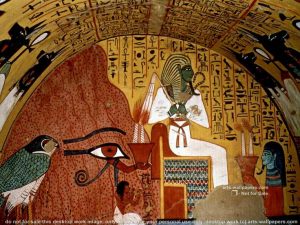The ancient Egyptians loved celebrations. The Egyptians celebrated the main Egyptian Festivals of the seasons and also celebrated festivals held in honor of the reigns of pharaohs. Egyptians made calendars to record the dates of birthdays, festivals, feasts, and holidays. Festivals in Ancient Egypt centered on procession by land and river and were celebrated on particular days or series of days in the official year.

Egyptian Festivals Calendars
Many of these calendars were inscribed on the walls of many temples. The calendars were also written in scrolls and in temple archives. Festival calendars list the details of some of the celebrations, such as the date and what the celebration is for and what it is about. The festival calendar also contains excellent references for offerings that had been required by the people associated with the events.
They believed that order and harmony were achieved through daily care of the gods; this might be through daily ritualistic rites of service to a god in a temple or through a multitude of festivals, celebrated on special days throughout the year. There were also the endowments required for the performance of these feasts.
The ancient Egyptian temple was the cult center of the local or state God and its religious rituals and practices were not public events. High priests, temple priests, court officials and sometimes the king would participate in and have knowledge of the temple rituals. Evidence for festivals can be found on the walls of Egyptian temples. Festival calendars or lists of ritual activities were inscribed on walls and doorways of temples.
From the Old Kingdom onward, festival calendars also contained explicit references to the offerings that were required by the deities associated with these events. Particularly for major events, the economic support of the king was required.
Hieroglyphic inscriptions on Old Kingdom tomb-chapel elements, particularly the architrave, include lists of important festivals with an emphasis on the beginning of the year, the late summer flood Opening of the Year, Thoth festival, First of the Year, Wag festival, Sokar festival, Great Festival, Flame Festival, Procession of Min and Sadj festival.
Some festival days were more important than others: New Year’s Day, Feast of Wagy, Feast of Anket, and Feast of Thuthi. New Year’s Day in Egypt was known as Wep-renpet. The first celebration was the New Year’s festival. for the ancient Egyptians. New Year’s Day wasn’t just the first day of the year, it was also the day rejuvenation and rebirth took place.